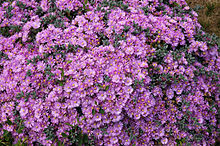Oscularia deltoides, the deltoid-leaved dewplant,[1] dassievygie or sandsteenvygie is a species of flowering succulent plant in the fig-marigold family Aizoaceae that is native to the south-western Cape, South Africa.[2]
| Oscularia deltoides | |
|---|---|

| |
| Scientific classification | |
| Kingdom: | Plantae |
| Clade: | Tracheophytes |
| Clade: | Angiosperms |
| Clade: | Eudicots |
| Order: | Caryophyllales |
| Family: | Aizoaceae |
| Genus: | Oscularia |
| Species: | O. deltoides
|
| Binomial name | |
| Oscularia deltoides | |

Description
editThis intensely flowering plant is found growing among sandstone rocks in the winter-rainfall mountains of the far south-western corner of South Africa. Growing to 30 cm (12 in) high and spreading indefinitely,[3] it has silver-blue foliage. The fat, succulent leaves are three-sided (hence the qualifier deltoides – "triangular"),[4] with red teeth on the margins. The stems are often tinged purple.
In the spring it produces masses of pink, almond-scented flowers.
Cultivation
editIt is increasingly grown in South African gardens as an ornamental plant and can easily be propagated from cuttings, which should be planted in a sunny position. This low-maintenance succulent spreads out forming a colourful mat and grows well on the rocky edge of flower beds where it cascades over the edge. It attracts butterflies. In colder temperate regions it requires winter protection or glass cover. It has gained the Royal Horticultural Society's Award of Garden Merit.[5][6]
It was previously classed in the genus Lampranthus, as Lampranthus deltoides.[7]
References
edit- ^ BSBI List 2007 (xls). Botanical Society of Britain and Ireland. Archived from the original (xls) on 2015-06-26. Retrieved 2014-10-17.
- ^ "Oscularia deltoides". SA National Biodiversity Institute. Archived from the original on 2021-12-14. Retrieved 23 July 2013.
- ^ RHS A-Z encyclopedia of garden plants. United Kingdom: Dorling Kindersley. 2008. p. 1136. ISBN 978-1405332965.
- ^ Harrison, Lorraine (2012). RHS Latin for gardeners. United Kingdom: Mitchell Beazley. p. 224. ISBN 9781845337315.
- ^ "Oscularia deltoides". Royal Horticultural Society. Retrieved 18 January 2021.
- ^ "AGM Plants - Ornamental" (PDF). Royal Horticultural Society. July 2017. p. 70. Retrieved 14 April 2018.
- ^ "Oscularia deltoides". Fernkloof Nature Reserve. Archived from the original on 8 March 2012. Retrieved 23 July 2013.
Further reading
edit- Mollers Deutsch. Gartner-Zeit. 1927, xlii. 187.
Media related to Oscularia deltoides at Wikimedia Commons